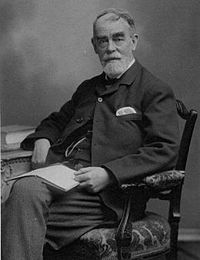Samuel Butler (novelist)
- For the 17th-century author of Hudibras, see Samuel Butler (1612-1680).

Samuel Butler (December 4, 1835 - June 18 1902) was a British writer best known for his satire Erewhon.
He was born in Langar Rectory, near Bingham, Nottinghamshire, England. He went to Shrewsbury School and St John's College, Cambridge, then emigrated to New Zealand (a British colony since 1840), where he wrote about his arrival and his life as a sheep farmer on Mesopotamia Station in A First Year in Canterbury Settlement (1863).
He returned to England in 1864, settling in rooms in Clifford's Inn (not far from Fleet Street), where he lived for the rest of his life. In 1872 his satirical novel Erewhon appeared anonymously, causing some speculation as to the identity of the author; when Butler revealed himself as the author, some expressed disappointment that none of the more famous personages speculated about had written it.
Erewhon made Butler a well-known figure, and he wrote a number of other books, including a not so successful sequel, Erewhon Revisited. His semi-autobiographical novel The Way of All Flesh did not appear in print until after his death, as he considered its tone of attack on Victorian hypocrisy too contentious.
Erewhon revealed Butler's long interest in Darwin's theories of biological evolution, though Butler spent a great deal of time criticising Darwin, not least because he believed that Charles had not sufficiently acknowledged his grandfather Erasmus Darwin's contribution to the origins of the theory.
Butler developed a theory that the Odyssey came from the pen of a young Sicilian woman, and that the scenes of the poem reflected the coast of Sicily and its nearby islands. He described the evidence for this theory in his The Authoress of the Odyssey (1897) and in the introduction and footnotes to his prose translation of the Odyssey. Butler also translated the Iliad. His other works include Shakespeare's Sonnets Reconsidered (1899), a theory that the Bard's sonnets, if rearranged, tell a story about a homosexual affair.
Project Gutenberg has available A first year..., Erewhon, Erewhon Revisited, The Way of All Flesh and several other of his works for free download at [1]. The Authoress of the Odyssey is apparently out of print and not online; however, Project Gutenberg also has available Butler's translations of the Odyssey and of the Iliad.
Samuel Butler's friend Henry Festing Jones wrote the authoritative biography: the two-volume Samuel Butler, Author of Erewhon (1835-1902): A Memoir (commonly known as Jones's Memoir), published in 1919 and now only available from antiquarian booksellers. Project Gutenberg [2] hosts a shorter "Sketch" by Jones. More recently, Peter Raby has written a life: Samuel Butler: A Biography (Hogarth Press, 1991).
In the 1920s Jonathan Cape published Butler's collected works in twenty volumes as The Shrewsbury Edition of the Works of Samuel Butler, but printed only 750 copies, making a complete set (if it can be found at all) unaffordable for the common reader. More easily available are the editions published by A.C. Fifield in 1908-1914. Erewhon and The Way of All Flesh remain in print as paperbacks.
